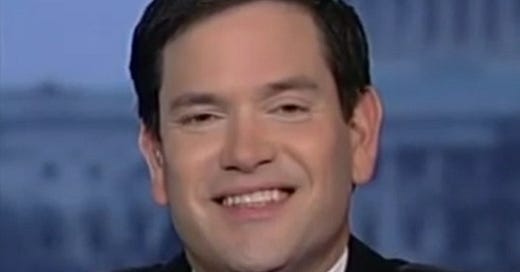Rubio: we can't remove a guilty president, since we never removed one in 243 years
Last month, Sen. Marco Rubio (R-FL) made the statement, "If I vote guilty, I will be voting to remove a President from office for the first time in the 243-year history of our Republic." Rubio then voted to retain President Donald Trump.
The Senator's math was a little off. There were no presidents of the United States 243 years ago. The first president assumed office on April 30, 1789, which was 231 years ago. That was George Washington, who never faced removal because he hadn't undergone impeachment.
Donald Trump, on the other hand, was impeached. That made him only the third U.S. President eligible for removal.
Trump was charged with "Abuse of Power" and "Obstruction of Congress."
Sen. Rubio conceded that Trump may indeed be guilty of the first charge.
"I assumed what is alleged is true," Rubio said. Yet he thought Trump's guilt was irrelevant because removal is not "supposed to be a way to hold Presidents accountable; that is what elections are for."
By saying a guilty president should be removed only by elections, Rubio took a position at odds with the Constitutional Convention. Far from designing a pure democracy like Rubio described, the founders drafted a Constitution that guarantees a republican form of government with checks and balances to ensure liberty is secured to the future and protected against tyrants.
Nowhere does the Constitution grant the president nor anyone else the power to abuse. Rather, the president is sworn to "take care that the laws be faithfully executed." Naturally, he is guilty of an impeachable high crime when he violates his oath. He is not expected nor permitted to use his position to pursue arbitrary human will.
Nor is he accountable to elections alone.
The founders placed impeachment in the Constitution to check the president, but also to check the electoral process. The founders were not proponents of a pure democracy, where the majority rules without protections for the minority. The rights of all are supposed to be secure, and offices of power are given by the people to temporary civil servants who are restrained by the other branches of government.
George Mason, the man who proposed the language "high crimes and misdemeanors" at the Convention, considered the elected nature of the presidency one of its most dangerous aspects. He, along with many founders, despised democracy for its “oppression and injustice.” Mason warned: “We are not indeed constituting a British government, but a more dangerous monarchy, an elective one.”
For a brief moment, the founders ignored this concern and entertained suggestions that elections be the sole means of holding a president accountable. Gouverneur Morris proposed making the president "unimpeachable" and removable by elections alone. But his plan was designed to work only if presidential terms were limited to two years. The convention decided against this brief term, and so removal of the executive was made available at any time. Morris eventually abandoned his election-only position in favor of four-year terms regulated by impeachment and removal.
Under Rubio's formulation, a president would be free to abuse power and obstruct Congress at will. Rubio has said he had opposed calls to remove former President Barack Obama, simply because two years were left in Obama's term, and he figured the people would clean up the mess with a new administration.
But if Rubio's invention becomes the standard, and the president is allowed to abuse power in between elections, the Constitution must be amended to reduce the president to two-year terms, and thus be true to the electoral accountability proposed by Gouverneur Morris.
The founders would have never considered four years of unaccountability acceptable for the U.S. President.




